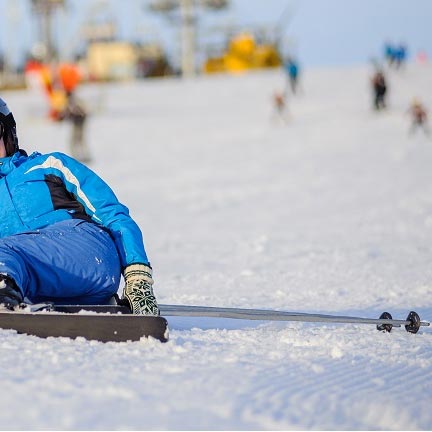When winter sports accidents leave you injured and searching for answers, a Washington, DC ski accident lawyer can help protect your rights and pursue the compensation you deserve. Each year, thousands of enthusiasts flock to ski resorts within driving distance of the DC metro area to enjoy skiing, snowboarding, and snow tubing. While these activities offer exhilarating winter recreation, they also carry significant risks that result in thousands of injuries and dozens of fatalities annually across the United States. Many of these accidents occur not from the inherent risks of winter sports, but from preventable instances of negligence by resort operators and their staff.
From improperly maintained equipment and inadequately marked hazards to poorly trained employees who create dangerous conditions on slopes and tubing tracks, resort negligence can take many forms. Some facilities fail to provide proper safety instructions or employ skiing instructors who lack the expertise to guide beginners safely. When these oversights lead to serious injuries, victims need experienced legal representation to hold negligent parties accountable.
If you or a loved one were injured in a skiing, snowboarding, or tubing accident, contact Regan Zambri Long for a free, no-obligation consultation to discuss your case.
Contact Us Today to Schedule
A Free Consultation
According to premises liability law, ski resorts owe you and other guests a reasonable duty of care. Therefore, if you or a loved one were harmed in a skiing, snowboarding, or tubing accident, you may be able to file a personal injury lawsuit. Even if you signed a waiver, you may have grounds for a successful injury claim.
If you or a loved one were harmed at a resort, picking a law firm with experience standing up to large businesses is important. Multimillion or billion-dollar companies own many ski resorts with access to significant legal resources. Furthermore, some states have laws that make securing compensation from winter resorts difficult. However, the DC premises liability lawyers at Regan Zambri Long have experience assisting victims of negligent business practices at resorts and other vacation spots nationwide. In one case, our attorneys helped a client secure a $6.2 million verdict against a resort in Virginia after he suffered brain trauma during a skiing accident. In another case, our lawyers obtained a settlement of $7.8 million for a client who was severely injured in a snow tube accident.
To learn how Regan Zambri Long can help you, contact an experienced ski injury lawyer today.

An estimated 124,000 winter-sports-related injuries were treated in emergency rooms across the United States in 2022, most of those injuries from skiing and snowboarding accidents. Winter resorts may offer snowboarding and tubing activities in addition to traditional skiing. Common hazards that can cause a preventable accident include:
If your resort accident was due to negligence, you need to call Regan Zambri Long. A dedicated ski injury lawyer will walk you through the legal process to ensure your rights are protected every step of the way.
Depending on the circumstances, holding one or more parties accountable for your ski accident injuries or loss may be possible. Parties typically named in ski and snowboard accident claims include:
Some states have “inherent risk laws,” meaning the skier, snowboarder, or snow tuber assumes the inherent risk of injury associated with these activities. However, in many cases, an attorney can work to demonstrate that your injuries resulted from factors that were not an inherent risk.
Additionally, many winter resorts also require you to sign a liability waiver. However, these waivers do not necessarily prevent you from filing a lawsuit. In many cases, you may still bring a claim and collect compensation under premises liability law. Still, always consult an attorney before taking further action.
Though lawsuits against resorts and other skiers can be complicated, a DC ski accident lawyer can help you get the compensation you need following your result accident. At Regan Zambri Long, we help ski accident victims collect compensation for:
How much compensation you recover will ultimately depend on the severity of your injuries and your ability to return to work. With the guidance of a ski injury lawyer from Regan Zambri Long, you can rest assured knowing you have recovered maximum compensation.

Contact Us for a Free Consultation Today
In Washington, DC, you have three years from the accident date to file a personal injury claim, including for skiing accidents. While this may seem like a lot of time, you must move quickly. Evidence will disappear, memories will fade, and your case will lose strength.
By contacting a ski accident lawyer in DC, you can be assured you are meeting filing deadlines, have established liability, and have the best chance of securing maximum compensation.
To begin the filing process, call the ski injury lawyers of Regan Zambri Long today.
Following a skiing or snowboarding accident, there are steps you should take to preserve future legal action.
Any sport comes with risks. Some of the most commonly reported ski injuries include:
If you suffered a severe injury from a ski resort accident, call Regan Zambri Long for dedicated legal guidance.
If you or a loved one was harmed during a snow tubing, ski, or snowboard accident, then it is important to speak to an attorney without delay. The laws and contracts that may apply to your case make ski and snowboard accident claims notoriously complex. However, a ski injury lawyer can help you determine your legal options and can represent your best interests in a lawsuit. Damages from a lawsuit can help pay for costs associated with a traumatic brain injury, spinal cord injury, or wrongful death. These include medical bills, lost income, rehabilitation expenses, and pain and suffering.
The DC personal injury lawyers at Regan Zambri Long take cases on a contingency fee basis. You will not owe us any fees unless we recover compensation for your injuries or loss. For more information on your possible legal options after a skiing or snowboarding accident, call or use our online contact form to describe your situation.